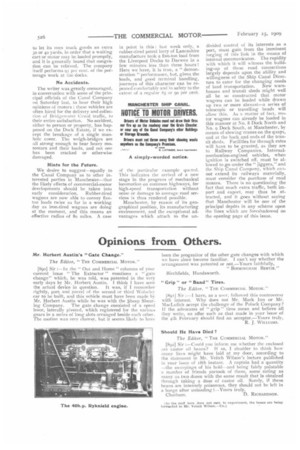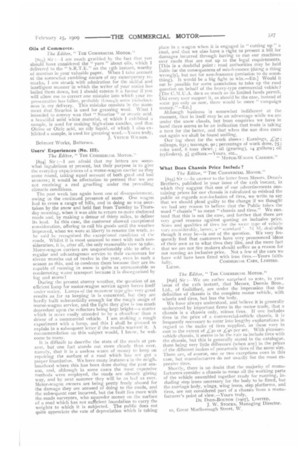Opinions from Others.
Page 24

Page 25

If you've noticed an error in this article please click here to report it so we can fix it.
Mr. Herbert Austin's "Gate Change."
The Editor, " THR COMMERCIAL MOTOR."
[890] Sir :—In the " Out and Home " columns of your current issue " The Extractor" mentions a "gate change" which, he was told, was patented in the very early days by Mr. Herbert Austin_ I think I have seen the actual device in question. It was, if I remember rightly, part and parcel of the second or third Wolseley car to be built, and this vehicle must have been made by Mr. Herbert Austin while he was with the Sheep Shearing Company. The gate ,change consisted of a speed lever, laterally pivoted, which registered for the various gears in a series of long slots arranged beside each other. The motion was very clumsy, but it seems likely to have been the progenitor of the other gate changes with which we have since become familiar. I can't say whether the arrangement was patented or not.—Yours faithfully, " BIRMINGHAM BERTIE."
Birchfields, Handsworth.
" G rip " or " Band " Tires.
The Editor, " THE COMMERCIAL MOTOR,"
1891] Sir :-11 have, as a w:er, followed this controversy with interest. Why does not Mr. Mark Inn or Mr. Mac.Lulich accept the challenge of the Polack Company? If the advocates of " grip " tires mean and believe all they write, an offer such as that made in your issue of the 4th February should find an acceptor.—Yours truly,
R. J. WILLIAMS.
Should He Have Died ?
The Editor, "THE COMMERCIAL Mcyroa."
[8921 Sir :—Could you inform me whether the enclosed are castor oil beans? If so, I shudder to think how many lives might have laid at my door, according to the statement in Mr. Veitch Wilson's lecture published in your k,me of t8th instant. A captain had a quantity —the sweepings of his hold—and being fairly palatable a number of friends partook of them, some eating as many as two dozen with the same result that is obtained through taking a dose of castor oil. Surely, if these beans are intensely poisonous, they should not be left in a barge after unloading 1--Yours truly,
Chatham. D. RICHARDSON.
The Editor, " TuE COMMERCIAL MOTOR."
[Seel Sir :-1 am much gratified by the fact that you should have considered the " yarn " about oils, which I
delivered to the " on the 15th instant, worthy of mention in your valuable paper. When I take account of the somewhat rambling nature of my extemporary remarks, I am struck with admiration for the skilful and intelligent manner in which the writer of your notice has boiled them down, but I should esteem it a favour if you will allow me to correct one mistake into which your representative has fallen, probably throuelt some indistinctness in my delivery. This mistake consists in die statement that Stearine is used for greasing wool. What I intended to convey was that " Stearine " or stanric acid, a beautiful solid white material, of which I exhibited a sample, is used for making high-class candles, and that Oleine or Oleic acid, an oily liquid, of which I also exhibited a sample, is used for greasing wool.—Yours
J. Velem Wtesos. , Belmont Works, Battersea.
Users Experiences (No. III).
The Editor," THE COMMERCIAL MOTOR."
18941 Sir am afraid that my letters are some
what lugubrious at present, but their purpose is to give the everyday experiences of a motor-wagon carrier as they come round, taking equal account of both good and bad seasons; it would be affectation to pretend that we are not receiving a real gruelling under the prevailing climatic conditions.
The past week has again been one of disappointment, owing to the continued presence of snow. One wagon had to cross a range of hills, and in doing so was overtaken by the snow and held fast from Tuesday to Thursday morning, when it was able to return to more sheltered roads and, by making a detour of thirty miles, to deliver its load. In this case, the customer showed exceptional consideration, offering to rail his goods until the weather improved, when we were at liberty to resume the work, as he said he recognised the exceptional condition of Ihv roads, Whilst it is most unusual to meet with such consideration, it is, after all, the only reasonable view to take. Motor-wagon carriers are unquestionably able to offer a regular and advantageous service to their customers for eleven months out of twelve in the year, even in such a season as this, and to condemn them because they are incapable of running in snow is quite as unreasonable as condemning Wester transport because it is disorganised by fog and storm !
During the present stormy weather, the question of an efficient lamp for motor-wagon service again forces itself under notice. Lamps of the motorcar type give very good results as far as keeping in is concerned, but they are hardly built substantially enough for the rough usage of motor-wagon service, and the light they give is too much dependent upon the reflectors being kept bright—a matter which is more easily attended to by a chauffeur than a driver of a commercial vehicle. I am making a rough experiment with a lamp, and this I shall be pleased to explain in a subsequent letter if the results warrant it. A recommendation on this subject would, I know, be welcome to many.
It is difficult to describe the state of the roads at present, but one fact stands out more clearly than ever, nantelv, that it is a useless waste of money to keep on repairing the surface of a road which has not got a proper foundation. We have many instance s in the neigh. bourhood where this has been done during the past season, and, although in some cases the most expensive methods were employed, the roads are already giving way, and by next summer they will be as bad as ever. Motor-wagon owners are being pretty ft-eels' abused for the damage they are accused of doing to the roads, and the subsequent cost incurred, but the fault lies more with the.roads surveyors, who squander money on the surface of a road which has not sufficient foundation to carry the weights to which it is subjected. The public does not quite appreciate the rate of depreciation which is taking
place in a wagon when it is engaged in "cutting up " a road, and that we also have a right to present a bill for damages incurred through having to run our machines over roads that are not up to the legal requirements. [This is a doubtful point : road authorities may be held liable for the consequences of mis-feasance (doing a thing wrongly), but not for non-feasance (omission to do something). It would be a big fight to win.—Ere] Would it not be possible for some association to take up the road question on behalf of the heavy-type commercial vehicle? ,[The doas as much as its limited funds permit. Did every user support it, as should be the case, instead of some 300 only as now, there would be more " campaign money."—ED.] Although business is somewhat indifferent at the moment, that in itself may be an advantage while we are under the snow clouds, but from enquiries we have in hand there seems to be an indication that trade is taking a turn for the better, and that when the sun does come out again we shall be found smiling.
Our log sheet for the week shows : Earnings, £37; mileage, 632; tonnage, so; percentage of work done, 75; coke used, 6 tons r8cwt. ; oil (gearing), 14 gallons; oil (cylinders), 51 gallons.—Yours, etc., " MOTOR-WAGON CARRIER."
What Does Chassis Price Include?
The Ediior, " THE COMMERCIAL MOTOR."
[Sc] Sir :—In answer to the letter from Messrs. Dennis Brothers, published in your issue of the nth instant, in which they suggest that one of our advertisements containing prices for our chassis is calculated to mislead the public as regards non-inclusion of tires, we write to say that we should plead guilty to the charge if we thought we had any reason to believe that the Public takes the word " chassis " to mean "chassis and tires." We contend that this is not the case, and further that there are very good reasons against quoting an inclusive price. Sizes and qualities of tires for the same type of vehicle vary considerably, hence, a " standard ' hi hl,desirable though it may tie—is out of the question. We very frequently find that customers have very pronounced ideas of their own as to what tires they like, and the mere fact that we are not tire makers should suffice as a reason for not naming an inclusive price. Not a few of the cars we have eold have been fitted with iron tires.—Yours faith
fully, COMMERCIAL CARS, LIMITED. Luton.
The Editor, " THE COMMERCIAL MOTOR."
[8961 Sir :--We are rather surprised to nate, in your
issue Of the uth instant, that Messrs. Dennis Bros., Ltd., of Guildford, are under the impression that the definition of chassis is the complete motor vehicle, with wheels and tires, but less the body.
We have always understood, and believe it is generally
understood by important firms in the motor trade, that a chassis is a chassis only, minus tires. If one includes tires in the price of a commercial-vehicle chassis, it is frequently necessary to enter into lengthy explanations in regard to the make of tires supplied, as these vary in cast to the extent of L:30 or .L74o per set. With pleasurevehicle chassis, it seems to be the rule to include tires with the chassis, but this is generally slated in the catalogue, there being very little difference (when any) in the prices of the different makes of pneumatic tires of the same size. There are, of course, one or two exceptions even in this case, but manufacturers do not usually list the most 6X.pensive tires.
Shortly, there is no doubt that the majority of manufacturers consider a chassis to mean all the working parts of the vehicle assembled together ready for running, intluding step irons necessary for the body to be fitted, but the carriage body, wings, wing irons, step platforms, and tires, are not considered part of a chassis from a manufacturer's point of view.—Yours truly, De DION-BOUTON (1907), LIMITED, J. W. STOCKS, Managing Director. to, Great Marlborough Street, W.






























